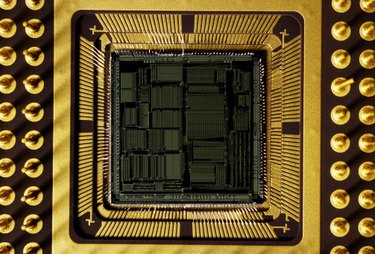
Some writers describe a computer's central processing unit, or CPU, as the "brain" of the machine. While this is something of an exaggeration as the CPU does not think the way you do, there are some real similarities between it and the human brain. The CPU compares information, does arithmetic, and has different kinds of memory. And, like your brain, it can be "retrained" to handle different activities.
Purpose
Video of the Day
A CPU executes programmed instructions to add, compare, and move data. It deals directly with information. The other parts of a computer serve to store data or bring it into or out of the CPU, but the CPU works actively on the data. The human brain, like the CPU, uses data gathered by the senses to help the body survive. Its purpose is to manage information, and it uses the rest of the body to gather information and act on it.
Video of the Day
Specialized Features
The brain contains many structures specialized to handle memory, abstract thinking, emotions, and communication with the body. It works as well as it does because of the fine-tuned nature of these parts. A computer's CPU consists of subparts called the arithmetic and logic unit, or ALU; registers, random-access memory; and other features. Each part works on chunks of data and passes them along to the other parts in an organized way.
Memory
Computers have several kinds of information storage, ranging from fast static random access memory (SRAM) to large amounts of relatively slow bulk storage, such as flash RAM and data DVDs. The CPU has memory units called registers, in which it performs immediate tasks such as comparing two numbers. It has other kinds of memory from which it gets its programming, and a "scratchpad" memory called cache, where it keeps recent data. Brains have short and long-term memory, as well as the capacity for dealing with immediate issues.
Programmability
Your brain comes with hardwired programming for actions such as breathing, sneezing and regulating your heart. Beyond those functions, you have an enormous capacity for gaining new abilities by learning. By loading different programs into memory, the CPU can perform a wide range of different tasks. Each program is a list of instructions drawn from the set available for a particular CPU; different CPUs have different, though similar, instruction sets. One list of instructions will add a set of numbers together; another lets you read email. The general-purpose and programmable nature of the CPU makes it a valuable and versatile tool.
Intelligence?
While computers can perform impressive feats, such as beating Grandmaster players at chess, demonstrating the general, adaptable intelligence of a 5-year-old child is, in 2011, still a distant goal. The problem is probably not the CPU itself, but the sophistication of its programming. Researchers working in the field of artificial intelligence (AI) do not yet fully understand all the facets that make intelligence work for human brains.